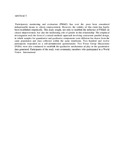| dc.contributor.author | Kibukho, Kennedy | |
| dc.contributor.author | Kidombo, Harriet | |
| dc.contributor.author | Gakuu, Christopher | |
| dc.date.accessioned | 2015-07-23T08:46:08Z | |
| dc.date.available | 2015-07-23T08:46:08Z | |
| dc.date.issued | 1915-03-20 | |
| dc.identifier.uri | http://journals.uonbi.ac.ke/damr/article/view/1294/1093 | |
| dc.identifier.uri | http://hdl.handle.net/11295/88676 | |
| dc.description.abstract | Participatory monitoring and evaluation (PM&E) has over the years been considered
indispensable means to citizen empowerment. However, the validity of this claim has hardly
been established empirically. This study sought, not only to establish the influence of PM&E on
citizen empowerment, but also the moderating role of gender in this relationship. The empirical
investigation took the form of a mixed-methods approach involving concurrent parallel design,
in which samples for quantitative and qualitative components were different but drawn from
the same population and data collected within the same timeframe. Two hundred and twelve
participants responded to a self-administered questionnaire. Two Focus Group Discussions
(FGDs) were also conducted to establish the qualitative mechanisms at play in the quantitative
data generated. Participants of the study were community members who participated in a
World Vision International’s PM&E model dubbed ‘Integrated Programming Model’. While
quantitative data were analysed through linear regression analyses, the qualitative component
utilized interpretive technique, coding and recursive abstraction. Both the quantitative and
qualitative findings support the notion that there is a positive linear relationship between
PM&E and citizen empowerment; and that gender does not significantly moderate the
relationship between PM&E and citizen. The study revealed that PM&E can be a tool for
pacifying the effect of inequality, since the experience of empowerment outcomes is not sensitive
to one’s gender. | en_US |
| dc.language.iso | en | en_US |
| dc.publisher | University of Nairobi | en_US |
| dc.subject | Citizen Empowerment; Participatory Monitoring and Evaluation, gender | en_US |
| dc.title | The influence of gender in the relationship between Participatory Monitoring and Evaluation, and Citizen Empowerment | en_US |
| dc.type | Other | en_US |
| dc.type.material | en_US | en_US |

